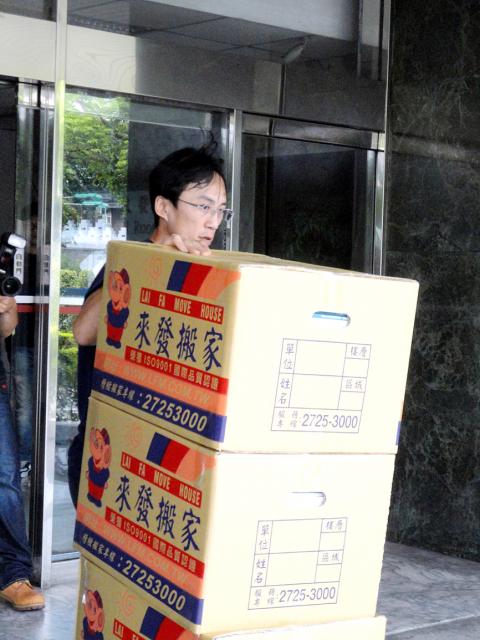In an abrupt about-turn, Premier Sean Chen (陳冲) yesterday approved Minister of Finance Christina Liu’s (劉憶如) resignation letter after she offered to step down on Tuesday, when the Cabinet’s original proposal for a capital gains tax on securities transactions was rejected by Chinese Nationalist Party (KMT) lawmakers.
The approval came less than a day after Chen said he wanted Liu to stay on to help negotiate a new version of the tax that would be acceptable to both the Cabinet and KMT lawmakers.
Chen said Deputy Minister of Finance William Tseng (曾銘宗) would take over Liu’s position until a successor is found.

Photo: CNA
The KMT legislative caucus proposed a new version of the tax late on Monday, called a “dual-track mechanism,” under which investors’ gains from trading securities would be taxed at a rate of between 0.2 percent and 0.6 percent only when the benchmark TAIEX is higher than 8,500 points, if they choose to have the tax based on the level of the index.
Under the Cabinet’s original plan, individual investors would be taxed between 15 percent and 20 percent on their annual gains of more than NT$4 million (US$134,400).
Following a brief meeting with Liu regarding her offer to resign on Tuesday evening, Chen decided to put off a decision on whether Liu should stay or leave until after the tax issue had been resolved.
Executive Yuan spokesperson Hu Yu-wei (胡幼偉) said Chen told Liu that she would have to remain in her position until her resignation had been approved.
On Monday night, Liu told a TV talk show that she had insisted on resigning, but that she would help negotiate a compromise while the Executive Yuan looked for a successor.
However, Liu took a day off yesterday and a removal company was seen picking up packages from her office several times in the afternoon.
Liu tendered a leave-of-absence form to the Executive Yuan to go on leave from yesterday until her resignation had been approved, Hu said.
Chen approved her resignation at 6pm, Hu added.
Meanwhile, Tseng said he would lead the Finance Ministry and manage all the minister’s duties.
“I will ask all my colleagues at the ministry to remain in their posts in the interim period,” Tseng said.
Additional reporting by Amy Su

DAREDEVIL: Honnold said it had always been a dream of his to climb Taipei 101, while a Netflix producer said the skyscraper was ‘a real icon of this country’ US climber Alex Honnold yesterday took on Taiwan’s tallest building, becoming the first person to scale Taipei 101 without a rope, harness or safety net. Hundreds of spectators gathered at the base of the 101-story skyscraper to watch Honnold, 40, embark on his daredevil feat, which was also broadcast live on Netflix. Dressed in a red T-shirt and yellow custom-made climbing shoes, Honnold swiftly moved up the southeast face of the glass and steel building. At one point, he stepped onto a platform midway up to wave down at fans and onlookers who were taking photos. People watching from inside

A Vietnamese migrant worker yesterday won NT$12 million (US$379,627) on a Lunar New Year scratch card in Kaohsiung as part of Taiwan Lottery Co’s (台灣彩券) “NT$12 Million Grand Fortune” (1200萬大吉利) game. The man was the first top-prize winner of the new game launched on Jan. 6 to mark the Lunar New Year. Three Vietnamese migrant workers visited a Taiwan Lottery shop on Xinyue Street in Kaohsiung’s Gangshan District (崗山), a store representative said. The player bought multiple tickets and, after winning nothing, held the final lottery ticket in one hand and rubbed the store’s statue of the Maitreya Buddha’s belly with the other,

‘NATO-PLUS’: ‘Our strategic partners in the Indo-Pacific are facing increasing aggression by the Chinese Communist Party,’ US Representative Rob Wittman said The US House of Representatives on Monday released its version of the Consolidated Appropriations Act, which includes US$1.15 billion to support security cooperation with Taiwan. The omnibus act, covering US$1.2 trillion of spending, allocates US$1 billion for the Taiwan Security Cooperation Initiative, as well as US$150 million for the replacement of defense articles and reimbursement of defense services provided to Taiwan. The fund allocations were based on the US National Defense Authorization Act for fiscal 2026 that was passed by the US Congress last month and authorized up to US$1 billion to the US Defense Security Cooperation Agency in support of the

‘COMMITTED TO DETERRENCE’: Washington would stand by its allies, but it can only help as much as countries help themselves, Raymond Greene said The US is committed to deterrence in the first island chain, but it should not bear the burden alone, as “freedom is not free,” American Institute in Taiwan Director Raymond Greene said in a speech at the Institute for National Defense and Security Research’s “Strengthening Resilience: Defense as the Engine of Development” seminar in Taipei yesterday. In the speech, titled “Investing Together and a Secure and Prosperous Future,” Greene highlighted the contributions of US President Donald Trump’s administration to Taiwan’s defense efforts, including the establishment of supply chains for drones and autonomous systems, offers of security assistance and the expansion of